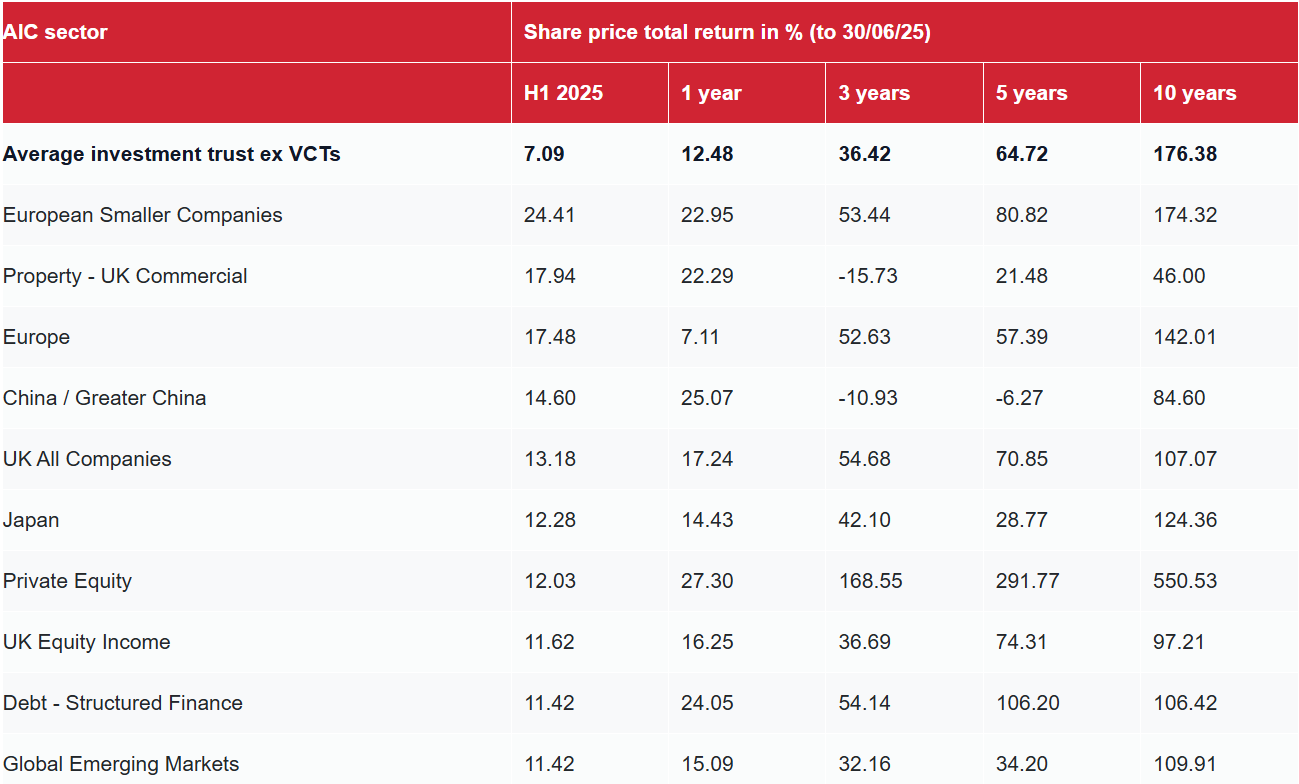Despite delivering some of the strongest returns in the investment trust universe, private equity vehicles have an image problem.
According to the Association of Investment Companies (AIC), IT Private Equity was in the top 10 best-performing sectors in the first half of this year. Over 10 years, it managed a 550.5% share price total return.
Ten best performing investment trust sectors in H1 2025

Source: AIC, Morningstar. Share price total return in % to 30/06/25. Excludes VCTs.
However, this figure is likely boosted by the exceptional performance of the £42.7bn 3i Group, which gained 1,195.2% over 10 years and currently trades at a 58.7% premium to net asset value (NAV).
In contrast, most other private-equity trusts are trading at steep discounts of around 25% to 30%.
At the AIC’s 2025 Investment Showcase, Colm Walsh, managing director of ICG Enterprise Trust, said: “Discounts are like Goldilocks: they are too high, too low and never just right.” The trust is currently trading on a 26.5% discount.
Also speaking at the event, Alan Gauld, lead manager of Patria Private Equity Trust – which is currently trading at an almost 30% discount – summed up the sector’s biggest challenge bluntly: “Private equity has terrible PR, frankly.”
He attributed this to a “perfect storm” of structural, regulatory and perception-driven challenges.
“For example, wealth managers – the typical buyers of investment trusts – are getting bigger through consolidation and investment trusts end up being quite small for them,” Gauld said.
“Interest rates and tariffs have also been difficult and are causing uncertainty, with merger and acquisition activity stalling.”
One consequence of this challenging environment is a slowdown in realisations, with managers reporting fewer exits.
The typical holding period for a private-equity trust ranges from four to six years but Gauld and Walsh maintained that they are happy to hold companies for longer to wait for the right time to exit.
“We recently had a realisation of [gym chain] David Lloyd Leisure, which we held for 13 years,” said Walsh. “It delivered an IRR [internal rate of return] of almost 20% over that time. We are long-term investors and very happy to wait for a good exit.”
Gauld noted that typical holding periods are likely to lengthen following the euphoric environment of 2020-2021, when valuations were inflated due to low interest rates, abundant liquidity and strong investor appetite, meaning private equity firms were deploying capital aggressively at premium prices.
“Managers buying at this time are going to have to hold those deals for longer,” he said.
“But private equity should be viewed over the long term. Investors tend to sell out when the cycle turns and buy back in when it is good – so they are missing out on the best vintages.”
Walsh also pointed to the argument that there is a lack of transparency around valuations.
“There is a very consistent pattern of material uplifts to the previous carrying value – in any given year, that could be up to 40%,” he said.
“Within the private-equity space there is no direct financial incentive to overvalue because all of the incentives that managers earn are only based on realised profits.”
It’s not all doom and gloom
Despite increased caution around private equity-based opportunities, not all investors are deterred from the sector.
Indeed, there is a growing retail presence, with Gauld noting that retail investors have been the fastest growing part of Patria Private Equity Trust’s shareholder base – increasing from around 8% five years ago to 13% today.
According to Rob Morgan, chief analyst at Charles Stanley, private equity trust’s so-called ‘PR issue’ could spell opportunity for patient, value-oriented investors that can look past the negative sentiment.
“If traditional UK buyers overlook the value on offer, you can be sure a bigger fish will emerge to swallow up parts of the sector at some point if sizeable discounts persist,” he said.
“We are therefore happy to allocate to the sector using established and reputable managers.”
In particular, he said there is a place for private equity in most growth-oriented portfolios, with investment trusts offering “an important gateway into private assets”.
“The closed-ended structure is also well suited to the asset class because managers don’t generally need to sell when investors do, which enables them to take a truly long-term approach,” he added.
Meanwhile, Andrew Rees, investment manager at EQ Investors, said he likes private-equity investments trusts “in principle”, however only recommends them to clients “with very significant restrictions”.
“Though they are liquid, the share prices can take significant time to represent any NAV movements, therefore we would only look to add them to clients with the longest time horizon,” he explained.
Despite significant buyback programmes, “discounts remain sticky”, Rees added. “Therefore, investors need to focus on which funds they expect the strongest NAV returns.”




